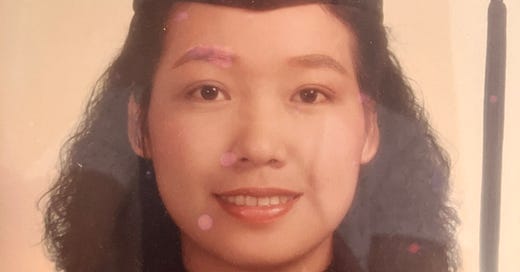
We come every day, Baba and I: the same hospital corridors, the same antiseptic air, the same soft beeping of machines marking time. Progress is not linear, we remind ourselves, though the words feel more like a spell than a belief. Some days, the light angles just right, catching on the dull white sheets, and for a moment, I almost believe in recovery. Once, Mama even smiled. A flicker, gone as quickly as it came. But mostly, she lies still. It is better than when she watches me with that gaze, the one that makes me unsure if she sees me or something beyond me. Sometimes, she tracks me; sometimes, she doesn’t.
Last night, I dreamt of a woman without arms, without legs. She needed me. I don’t know if she spoke or if I understood. I had to care for her. She leaned in, her breath warm on my neck, unbearably close, and I felt it—a stirring, an unease, the terrible intimacy of helplessness. I woke unsettled, the sensation still clinging to my skin.
I adjust Mama’s gown in the morning, tucking in the edges and smoothing the fabric over her collarbone. The fabric shifts, and suddenly, her nipple is exposed—pale, slack, unguarded. My body seizes. The shock, the horror, the quiet panic of seeing something I was never meant to. I force my hands to keep moving, to cover her again. What happens to the Oedipal complex now? Is this the other side—the grotesque inversion, the child recoiling instead of clinging? I remember the Greek myth Mama used to tell me when I was young, though I discovered that she had altered the story for her own expression. A son, imprisoned, visited by his mother. He begs for a final mercy, to drink from her breast one last time. And so she obliged. But when he began drinking from her breast, he bit down—hard. I never understood why she told me that story or extracted only those parts. But now, standing over her, I feel it: the need to separate, to keep apart.1
Andrea once told me I had the least Oedipal complex of anyone he knew.2 I never quite understood what he meant. These Jungians, with their need to universalize everything. But maybe he was right. Maybe that absence was itself a pathology, a refusal to attach, grieve, and surrender to the unbearable closeness of need.
I unscrew the cap of the moisturizer and begin rubbing it onto Mama’s skin. Three decades, I would have refused. I hated the feel of cream, the sensation of something lingering on my hands, the breach of my boundaries. Maybe it was my autism, the overwhelming tactility, or perhaps it was the deeper resistance, the refusal to let someone else’s body impose itself onto mine. But now she lies still, her body unresisting, and I rub the cream into her arms, her legs, the thin skin of her hands.
At the bar last week, I listened to a group of women talking about dating older men. They spoke gleefully, measuring the distance between desire and disgust. It’s the smell, one of them said, shaking her head. I can’t stand it. But they still dated them, didn’t they? What was it they wanted—security, stability? Or was it their fear of their own aging bodies, the unbearable proximity to what they would eventually become?
Baba massages Mama constantly. An old habit, an old belief—traditional Chinese medicine, the idea that circulation must be maintained, that pain must be worked through, never avoided. Mama does not respond much, but still, he presses into her wrists, her calves, her temples. Did you notice? If I bend her wrist this way, she grimaces.
I feel my irritation rise. Not everything has to be about pain.
Baba barely looks up. You have to massage through the pain.
I have always hated his massages, but I do not tell him.
When Ellie, our neighbor, comes to visit, she watches Baba kneading into the unresisting flesh of her arm. She turns to me, murmurs under her breath, Is he allowed to do that?
I give her a look, half-shrug. Who decides what is allowed in a place like this?
Junshin sends me a message, something absurd, something designed to make me laugh. I stare at my phone, biting my lip to suppress it. I’m trying to hold it in, I type. Surrounded by death and solemnity. He sends something worse, something so stupid I nearly choke on the effort to keep my face still.
Have I become one of those nurses, the ones who move through the hallways of the dying with exaggerated life, their voices too bright, too buoyant, as if sheer force of will can push back the inevitable? I watch them sometimes, the way they laugh, the way they chat about their plans, their errands, their days off, their lives, while adjusting a ventilator or checking an IV drip.
The hospital is a kind of limbo, a place that belongs to no one. Like an airport, it is not a destination, only a passage. I think sometimes of going to the airport just to sit, to have a coffee, to watch people come and go. To move through the machinery of transit without the burden of leaving. There was a man once who lived in first-class lounges, buying refundable tickets so he could exist in a space where no one truly belonged, where life was suspended between departure and arrival.
A visit? My analyst asked.
No! I insisted. A transit!
A transit. A movement toward something that cannot be reversed.
Mama’s body beneath my hands is still. I expected to be terrified of this—of aging, of death, of the irreversible entropy of flesh. But I feel nothing. Only the trace of what once was. Her youth, her vitality, an image already slipping into the space between memory and dream.
The myth that she was borrowed from could have been the Roman legend of Pero and Cimon, recounted in Valerius Maximus' Facta et Dicta Memorabilia (1st century CE), in which a daughter secretly breastfeeds her imprisoned father to keep him alive.
The inversion unsettles me. In the original myth, the child is nourished; in the version my mother told, he bites down. I don’t know if she altered it deliberately or if this was simply the shape it took in her memory. But the meaning shifts—what was once an act of devotion became an injunction of separation. A clean break, a refusal to feed.
The west has an obsession with Oedipus Rex. The way it is spoken with a kind of exasperation, as if it were both prophecy and prison. An Italian man who grew up far from his mother—boarding school, I suspect, though he never said so outright—he carried the myth like a loose thread in his psyche, tugging at it but never unraveling it completely.
For him, Oedipus wasn’t about desire but about inevitability. Not the mother as object, but the mother as absence, as structure, as the thing shaping you whether you know it or not. Freud, he thought, had ruined the story, made it small, turned it into a family melodrama. The real terror, he insisted, was recognition—the moment you see yourself for what you truly are, and it is too late.
I think about the way we struggled differently with this relationship—his longing buried under theory, turned outward as frustration, mine recoiling at the moment of too much closeness. He chased the myth, turned it over, tried to make sense of it. I never saw my mother as something to resolve. Just something I circled, carefully, at a distance.












Share this post